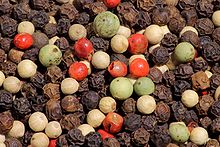BLACK PEPPER
- Chef Bwizzy
- Apr 27, 2017
- 2 min read

SCIENTIFIC NAME: Piper nigrum
Black Pepper is a flowering vine that is mostly cultivated because of its fruit which is dried and used for spice and seasoning. When dried, the fruit is known as peppercorn. It is known to lose its flavor and aroma through evaporation. It is advised to store them in airtight storage cans. Do not expose to light else, it will also lose its flavor and spiciness.
Once the peppercorns are dried, pepper spirit and oil can be extracted from the berries by crushing them. Pepper spirit is used in many medicinal and beauty products. Pepper oil is also used as an Ayurvedic massage oil and used in certain beauty and herbal treatments.
VARIETIES
Black Pepper - still-green, unripe drupes cooked briefly in hot water, and then dried in the sun or by machine for several days, during which the pepper around the seed shrinks and darkens into a thin, wrinkled black layer. Once dried, the spice is called black peppercorn.
Green Pepper - like black, is made from the unripe drupes. Dried green peppercorns are treated in a way that retains the green color, such as treatment with sulphur dioxide, canning or freeze-drying. Pickled peppercorns, also green, are unripe drupes preserved in brine or vinegar.
White Pepper - fully ripe red pepper berries are soaked in water for about a week, during which the flesh of the pepper softens and decomposes. Rubbing then removes what remains of the fruit, and the naked seed is dried.
Wild Pepper - Wild pepper grows in the Western Ghats region of India.
Orange/Red Pepper - Ripe red peppercorns can also be dried using the same color-preserving techniques used to produce green pepper.
Pink Pepper - Pink peppercorns are the dried berry fruits of a plant from a different family, the Peruvian pepper tree, Schinus molle.
NUTRITIONAL VALUES
One tablespoon of black pepper contains a reasonable amount of manganese, iron, vitamin K, traces of protein and dietary fiber.
HEALTH BENEFITS
It is believed to cure several illnesses, such as constipation, insomnia, oral abscesses, sunburn and toothaches.
In the 5th century, it was recommended to treat eye problems, often by applying salves or poultices made with pepper directly to the eye. There is no current medical evidence that any of these treatments has any benefit.
Black pepper is known to cause sneezing. Some sources say that piperine, a substance present in black pepper, irritates the nostrils, causing the sneezing. So if your nose is congested, this will help you sneeze out.
Piperine is under study for its potential to increase absorption of selenium, vitamin B12, beta-carotene and curcumin, as well as other compounds.
SWIT KITCHEN’S NOTE: Remember too much of everything is bad. Eat in moderation. Not too much and not too little. #Balanceyourlife















Comments